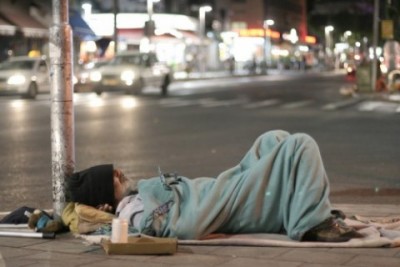Can one’s ‘home’ be on the street, on a park bench, or under a bridge? Can it be in a house where there is so much hoarded ‘stuff’ that one can barely move? Or perhaps in a home that an agency would deem to be unsafe and uninhabitable? What about the pristine homes of those suffering from OCD or the ‘clean freaks’? And we cannot forget about the million-dollar mansions of the rich and famous (as well as the not-so-famous). A nice house doesn’t always equate to a ‘home.’
NonProfitQuarterly.org reported that Mayor Maryann Edwards seeks to eliminate homelessness in her city, Temecula California. Her goal is to do so without spending tax-payer dollars on a bureaucratic agency that will do little to actually solve the problem. She plans to accomplish this by collaborating with non-profit organizations and churches. It has become evident that any politician, who believes throwing tax dollars at a problem does not automatically solve it, will be labeled insensitive, out of touch, and even cruel. It is the knee-jerk reaction of those who believe that we can ‘save the world,’ if the government would just collect more revenue.
Of course, there are those who are in desperate need of help. Of course, help should be made available to those individuals. God’s word instructs us to help the poor. Deuteronomy 15:10-11 10 Give generously to the poor, not grudgingly, for the Lord your God will bless you in everything you do. 11 There will always be some in the land who are poor. That is why I am commanding you to share freely with the poor and with other Israelites in need. (NLT)
New Testament scripture tells us; 15 Suppose you see a brother or sister who has no food or clothing, 16 and you say, “Good-bye and have a good day; stay warm and eat well”—but then you don’t give that person any food or clothing. What good does that do? James 2:15-17(NLT) Jesus demonstrated the model of compassion that we are to follow. We cannot insensitively turn away, disregarding those in need. But most of those to whom Jesus showed compassion were seeking help. Even those who did not see their own need at the time accepted help when they realized it.
When people are content in their current situation no amount of outside ‘help’ can force them to change it. In addition, those who view this as a societal problem that government needs to ‘fix,’ while excluding the possibility that some do indeed choose be homeless, are refusing to face reality. The truth is that some desperately need help and will seek it and accept it. Some need help and don’t know where to get it. – We must support them. Some do not or cannot even see their own need. – We must try to help them, as well. There are others who don’t believe that they are in need. They think they are just fine where they are. We should make an effort to persuade them of the better alternatives that are available. But there are others who like their lives just as they are. They have no desire to change their life or to listen to anyone else about how they can improve their situation.
I liken this to the dilemma we face when presenting the gospel. Our responsibility is to share the gospel – to present the need of salvation through Jesus Christ. Though we are called to ‘go and tell,’ we cannot force someone admit their need.
When we make ‘Christ’s Heart Our Home,’ we learn how much better our life is when Jesus becomes a part of it. He cleans all the rooms in our house (our heart) and puts it in order. We may not have realized the necessity at the time, but when we admitted our need God gave us a room in His mansion.
Some people don’t want to live in His mansion. Some people, choose to live (spiritually) alone… on the street or under a bridge. – As do some of the homeless among us.
 The Bottom Line, Ministries Christian News, Articles, & Poetry
The Bottom Line, Ministries Christian News, Articles, & Poetry 





You are correct. At the area rescue mission where I speak once a week I see both sides, those who are comfortable and complacent staying at the mission and those who have moved on to a better life.